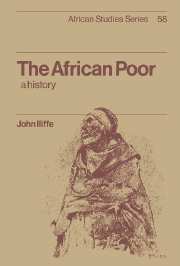Book contents
- Frontmatter
- Contents
- Preface
- 1 The comparative history of the poor
- 2 Christian Ethiopia
- 3 The Islamic tradition
- 4 Poverty and power
- 5 Poverty and pastoralism
- 6 Yoruba and Igbo
- 7 Early European initiatives
- 8 Poverty in South Africa, 1886–1948
- 9 Rural poverty in colonial Africa
- 10 Urban poverty in tropical Africa
- 11 The care of the poor in colonial Africa
- 12 Leprosy
- 13 The growth of poverty in independent Africa
- 14 The transformation of poverty in southern Africa
- Notes
- Bibliography
- Index
3 - The Islamic tradition
Published online by Cambridge University Press: 31 October 2009
- Frontmatter
- Contents
- Preface
- 1 The comparative history of the poor
- 2 Christian Ethiopia
- 3 The Islamic tradition
- 4 Poverty and power
- 5 Poverty and pastoralism
- 6 Yoruba and Igbo
- 7 Early European initiatives
- 8 Poverty in South Africa, 1886–1948
- 9 Rural poverty in colonial Africa
- 10 Urban poverty in tropical Africa
- 11 The care of the poor in colonial Africa
- 12 Leprosy
- 13 The growth of poverty in independent Africa
- 14 The transformation of poverty in southern Africa
- Notes
- Bibliography
- Index
Summary
The written sources from the Islamic societies of the West African savanna before the twentieth century are less numerous than from Ethiopia but more abundant than from most other parts of sub-Saharan Africa. In both regularity of contact and similarity of social organisation, the savanna was closer to the wider Islamic world than Ethiopia was to the rest of Christendom, so that patterns of poverty within Islam had much in common. Nevertheless, abundant land, political and environmental insecurity, lack of institutionalisation, distinctive family systems, and a pervasive personalism characterised poverty in the savanna as elsewhere in Africa. What most distinguished the region from Ethiopia was that towns were more important in the savanna.
Both in number and origin, the very poor of the West African savanna were similar to those of Ethiopia. In normal times most were incapacitated. Early in the twentieth century a scholar named Imam Imoru wrote that in the Kano Emirate, the heartland of the Hausa people in what became Northern Nigeria,
there are rich people, tajirai, and there are poverty-stricken people, matsiyata, who barely eke out a living.
Kano has more diseases and illnesses than any other Hausa land. There is a vast number of sick people there: many lepers, kutare, cripples, guragu, blind people, makafi, and people with spinal deformities, kusanti. There are also mentally ill people, mahankata, some of whom walk about spitting. […]
- Type
- Chapter
- Information
- The African PoorA History, pp. 30 - 47Publisher: Cambridge University PressPrint publication year: 1987



